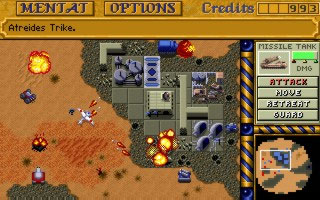Raised By Screens, Chapter 8: Dune II
He who controls a 486 controls The Spice
Raised By Screens is probably the closest I’ll ever get to a memoir – glancing back at the games I played as a child in the order in which I remember playing them, and focusing on how I remember them rather than what they truly were. There will be errors and there will be interpretations that are simply wrong, because that’s how memory works.
The golden years began. The PC's imperial period in the early 1990s was not coincidentally the time in which I changed from a boy who sometimes played games into a boy for whom games were his major interest.
This shift occurred on two fronts. At school and at friend's houses there was the social gaming, which primarily revolved around Street Fighter II, Super Mario on passed-around Gameboys and an Aliens coin-op in the local corner shop (whose other main stock and trade, given its proximity to an all-boys school, was the breast-centric Daily Sport newspaper).
At home, there were increasingly complex singleplayer PC games, which I disappeared into for as long as I was allowed, and played in silence bar occasional exercise of my growing lexicon of cursewords whenever I was confident my family were not in earshot.
1992-1994 was essentially an unbroken run of The Best Games In The World for me. Even those games which in retrospect lacked that special edge became of burning importance because they were my games - games I'd specifically chosen to play or even in some cases buy, rather than games which arrived on a biro-scrawled cassette or disc by hand-me-down serendipity.
Hand-me-down remained my primary method of obtaining a game, however. While manual and codewheel-based copy protection methods were on the rise, there was little that a photocopier at a parent's office couldn't overcome, and writeable floppy disks were becoming increasingly affordable.
The games I played were a combination of recommendation and request - I'd hear it mentioned somewhere and ask the kid in the next class who somehow had all the games, or someone would actively offer me a copy of something (even though they in any other regard wouldn't be seen dead with me) because they wanted to talk to someone else about it, or simply to show off their knowledge. I wasn't cool enough to know music, or to have music shared with me, but for games at least I was in the clubhouse. Such treasures I received. Before long, for the first time, I was building.
DUNE II: BATTLE FOR ARRAKIS
1992, PC
DEVELOPED BY WESTWOOD STUDIOS, PUBLISHED BY VIRGIN INTERACTIVE
The prototypical real-time strategy game - build up an army with which to smash the opposition's base. Based on Frank Herbert's sci-fi novels.
It hurts a little to look back at images of Dune II now, because while they are instantly recognisable as it, they don't show what I remember the game showing.
I remember sweeping deserts, vast armies crossing endless hostile terrain to reach an enemy base a world away. I remember Harvesters surrounded by clouds of sand, the earth shaking around them as a Sandworm approached. I remember struggling to survive in a land that wanted me dead. I remember something so simple as placing a concrete slab on the sand as a triumphant achievement of expression and planning.
Seeing Dune II's orange squares , squat, chubby vehicles and small, restrictive maps is a brutal comedown. Of all the games of my youth, Dune II is the one that I most desperately wish matched up with my memories.
The confluence of setting and genre (though of course 'real-time strategy' barely even existed as a phrase back then) was peerless, and I still feel something was lost when games like this moved away from the concept of gradually building up a civilization in the hostile wilderness and to building a military base at speed on Earth. Command & Conquer was perhaps the obvious way for Dune II's developers to go afterwards, both in terms of being creator-owned and Earthly, but it lost the mystique and the rawness.
It lost the Spice, too. Never has there been a better, clearer omni-resource. The Spice is a drug, ergo the Spice is money. The Spice doesn't need any more explaining than that. The Spice can buy anything, and in Dune II's case, that anything is buildings, vehicles and weapons. Dune II really leant on the idea that most of this stuff was being brought in from off-world as a result of trading, rather than simply built from the land around it. The image, from the game's introductory movie, that opens this chapter has always remained with me, precisely because it conveyed this idea of vast structures being flown in from far away. Everything in Dune II seemed so immense - to see its smallness now breaks my heart.
The game drove me to the books, rather than vice-versa, and that in turn led to a huge appetite for any sci-fi novel I could lay hands on. I became enraptured by fictional mythologies. As meaningless a term as 'geek' may be, Dune II is why I am one.
It was the first game I disappeared into. I'd had fleeting obsessions before, but those were games played just for an hour or two, once or twice a week. Dune II I played every night, every weekend, doodled images from it on school text books (my history teacher mocked my wobbly-winged Ornithopters in front of the whole class), completed it with all three houses multiple times, determined to find more, but most of all enraptured by building, by leaving my mark on an alien world. I didn't need anyone else - I only needed the sand, and The Spice.I so dearly wish I could go back to how that felt.
Today's young people are experiencing that with Minecraft right now - building things in the wilderness - and while the tools they have at their disposal are capable of so much more than Dune II's simple, square base-building, the appeal is the same. I envy them.
There’ll be a new chapter of Raised By Screens every Thursday at 1.30pm UK time, until it reaches its end.











